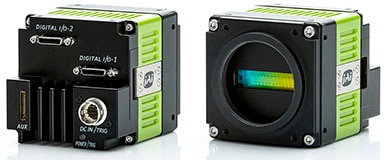JAI has added a new high-speed trilinear color line scan camera to its Sweep Series camera family. As JAI's first trilinear camera, the new SW-4000TL-PMCL features a custom CMOS imager with 4K(4096 pixels) resolution and a maximum full line rate of 66 kHz for 24-bit non-interpolated RGB output.

The new SW-4000TL-PMCL trilinear camera expands the options for designers of color line scan-based systems, which have previously relied on JAI’s Sweep+ Series of prism-based RGB and RGB+NIR line scan cameras to deliver the maximum in color image fidelity, sensitivity, and configuration flexibility.
The high performance trilinear technology in the SW-4000TL-PMCL has been combined with a broad set of advanced features - many of them unique among high speed trilinear cameras - to give designers an attractive alternative for applications not requiring the ultimate precision provided by prism cameras.
Horizontal and vertical binning
For example, the custom CMOS imager features not just three, but six separate lines of 7.5-micron pixels with two lines each of red, green, and blue pixels. This arrangement makes it possible for the SW-4000TL-PMCL to provide horizontal binning, vertical binning, or both – a feature not offered on other high-speed trilinear cameras. Furthermore, the sensor’s readout architecture combines the readout of two pixels through a single diffusion node to double the signal without increasing noise, enabling the binning process to dramatically increase sensitivity.
Built-in color space conversion functions
Another unique feature is the built-in color conversion capability that allows the SW-4000TL-PMCL to provide native HSI or CIEXYZ color output, in addition to offering conversions from standard RGB to the sRGB or Adobe RGB color spaces, or even to a user-defined custom RGB conversion matrix.
Direct encoder connection and auto-detection of scan direction
In addition to standard trilinear features like spatial compensation and tilted view correction to maintain proper synchronization and alignment of the R, G, and B channels, the SW-4000TL-PMCL features four separate input lines plus built-in algorithms to support direct connection from up to two rotary encoders. This eliminates the need to connect the encoder via the frame grabber, simplifying the cabling and reducing the possibility of lines being dropped due to issues between the frame grabber and the camera.
The direct encoder connection capability can also be used to daisy-chain multiple SW-4000TL-PMCL cameras to each other in multi-camera setups, and can be used to automatically detect if the scan direction changes. If a reversal of direction is detected, the spatial compensation can be adjusted for the correct line sequence. This feature is extremely useful for scenarios such as when a reciprocating slide table is being used as the method of conveyance.
Other features
Additional standard features include gain and black level adjustment, manual or automatic white balancing, shading correction, PRNU and DSNU correction, and time stamping of line data.
The SW-4000TL-PMCL utilizes a Camera Link interface with Mini CL connectors to output line data. Base, Medium, Full, or Deca configurations are supported, depending on the bit depth and line rate required. 3 x 8-bit and 3 x 10-bit output can be selected.
Power can be provided via the Camera Link interface or with a separate power supply connected to the camera’s 12-pin Hirose connector.
Two different lens mount options are available – a Nikon F-mount or an M42x1 mount with a 16 mm flange back distance.
Typical applications:
With its high performance and robust feature set, the SW-4000TL-PMCL offers an affordable alternative to prism technology for inspection of a wide range of materials, including:
- Printed material
- Textiles
- Plastic films or sheeting
- Roofing materials
- Medical slides
